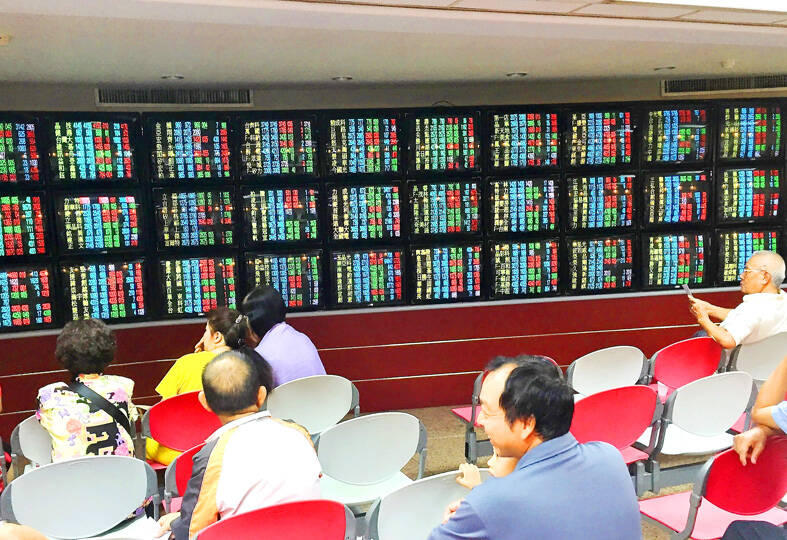Taiwanese shares last week rose from the previous week in tandem with a rally of tech stocks on Wall Street, but investors should remain cautious about negative developments emerging from global markets while the local bourse is closed for the Lunar New Year holiday, analysts said.
Keeping as much cash in hand as possible is the safest choice, they said, advising to delay investments until the end of the holiday for a clearer picture of the global market.
The TAIEX closed at 14,824.13 points on Friday, a weekly increase of 3.14 percent and ranking third in Asia, behind a 4.20 percent rise in Seoul’s KOSPI and a 3.56 percent advance in Hong Kong’s Hang Seng Index.

Photo: Kelson Wang, Taipei Times
As daily stock turnover averaged below NT$200 billion (US$6.58 billion) last week, investors appear to remain wary of the risk of long holidays as well as the volatility of US stocks, SinoPac Securities Investment Service Corp (永豐投顧) said in a note on Friday.
However, the TAIEX has been able to defy market headwinds and stay firmly above the 14,000-point mark in recent sessions, despite the comparatively low rate of share transactions, SinoPac said.
The local bourse is scheduled to close from Wednesday to Jan. 29 for the Lunar New Year holiday. The long break coincides with the US earnings season and comes ahead of the US Federal Reserve’s meeting from Jan. 31 to Feb. 1.
The long holiday is expected to weigh on manufacturers’ sales performance as production lines would be closed for almost half a month, SinoPac said.
However, companies in tourism and consumption-related sectors should see sales increase significantly during the holiday, it added.
Allianz Global Investors Taiwan Ltd (安聯投信) said it expects Taiwanese equities to return to focus on fundamentals after the holiday in anticipation that the Fed’s next rate hike would be in line with market expectations.
Taishin Securities Investment Advisory Co (台新投顧) said the resumption of foreign purchasing of local shares would benefit liquidity momentum in the market.
Foreign institutional investors bought a net NT$89.02 billion of shares on the main board last week, following a net purchase of NT$6.61 billion the previous week, exchange data showed.
United Microelectronics Corp (聯電), Taiwan Semiconductor Manufacturing Co (台積電) and Shin Kong Financial Holding Co (新光金控) were the top three stocks bought by foreign institutional investors last week, the data showed.
However, local shares are likely to maintain a consolidation pattern ahead of the long holiday, even if buying interest picks up in domestic demand stocks, Taishin said.

PERSISTENT RUMORS: Nvidia’s CEO said the firm is not in talks to sell AI chips to China, but he would welcome a change in US policy barring the activity Nvidia Corp CEO Jensen Huang (黃仁勳) said his company is not in discussions to sell its Blackwell artificial intelligence (AI) chips to Chinese firms, waving off speculation it is trying to engineer a return to the world’s largest semiconductor market. Huang, who arrived in Taiwan yesterday ahead of meetings with longtime partner Taiwan Semiconductor Manufacturing Co (TSMC, 台積電), took the opportunity to clarify recent comments about the US-China AI race. The Nvidia head caused a stir in an interview this week with the Financial Times, in which he was quoted as saying “China will win” the AI race. Huang yesterday said

Nissan Motor Co has agreed to sell its global headquarters in Yokohama for ¥97 billion (US$630 million) to a group sponsored by Taiwanese autoparts maker Minth Group (敏實集團), as the struggling automaker seeks to shore up its financial position. The acquisition is led by a special purchase company managed by KJR Management Ltd, a Japanese real-estate unit of private equity giant KKR & Co, people familiar with the matter said. KJR said it would act as asset manager together with Mizuho Real Estate Management Co. Nissan is undergoing a broad cost-cutting campaign by eliminating jobs and shuttering plants as it grapples

The Chinese government has issued guidance requiring new data center projects that have received any state funds to only use domestically made artificial intelligence (AI) chips, two sources familiar with the matter told Reuters. In recent weeks, Chinese regulatory authorities have ordered such data centers that are less than 30 percent complete to remove all installed foreign chips, or cancel plans to purchase them, while projects in a more advanced stage would be decided on a case-by-case basis, the sources said. The move could represent one of China’s most aggressive steps yet to eliminate foreign technology from its critical infrastructure amid a

MORE WEIGHT: The national weighting was raised in one index while holding steady in two others, while several companies rose or fell in prominence MSCI Inc, a global index provider, has raised Taiwan’s weighting in one of its major indices and left the country’s weighting unchanged in two other indices after a regular index review. In a statement released on Thursday, MSCI said it has upgraded Taiwan’s weighting in the MSCI All-Country World Index by 0.02 percentage points to 2.25 percent, while maintaining the weighting in the MSCI Emerging Markets Index, the most closely watched by foreign institutional investors, at 20.46 percent. Additionally, the index provider has left Taiwan’s weighting in the MSCI All-Country Asia ex-Japan Index unchanged at 23.15 percent. The latest index adjustments are to